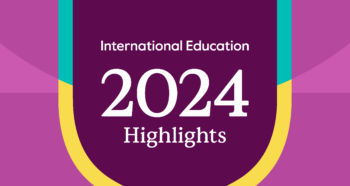Getting into college in the US is notoriously competitive. With competition for places becoming increasingly global, some of the hardest colleges to get into accept just 5% of applicants.
Moreover, getting admitted is just the beginning. US Department of Education figures suggest that around 80% of Americans will enrol in college at some point, though only half will graduate with a four-year degree.
Given these factors, how can the qualifications students take in high school help boost their chances of getting into and succeeding at university?
Over the last seven years, I have carried out extensive research to assess how well students who took Cambridge qualifications at high school do at college. Along with my colleagues, I have investigated whether Cambridge courses help students perform better than other programmes, looking at both quantitative and qualitative factors.
Cambridge International qualifications are an increasingly popular choice for US schools. We are one of several providers of curriculum and assessments, alongside the International Baccalaureate (IB) and the US-based Advanced Placement (AP).
Currently working with over 400 schools, we provide both Cambridge International AS or A Levels, as well as an ‘accelerated’ full programme of study, the Cambridge Advanced International Certificate of Education (AICE[i]) diploma (which comprises a combination of AS and A Levels).
Getting into college
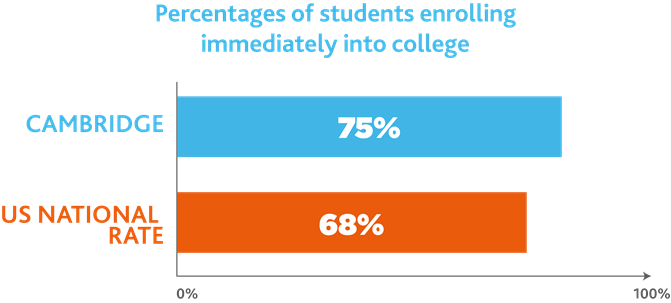
Our first consideration was to see if Cambridge qualifications helped students get admitted into college, and the answer was a resounding yes. Data from the National Student Clearinghouse, covering 3600 colleges and universities, showed that students with Cambridge qualifications enrolled immediately (that is, by the December immediately following high school completion) at a rate of over 75%, compared with the US national rate of 68%.
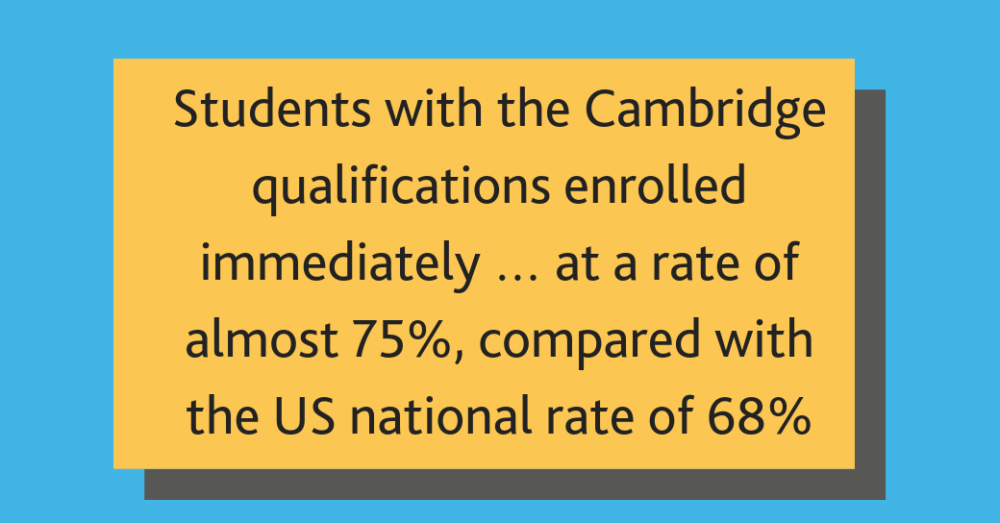
First year success
Then we asked: do Cambridge students do better in their first year of college study than other students (measured by Grade Point Averages, or GPAs)?
Our research, using data from over 8500 students at Florida State University, tells us that yes, students who have taken the Cambridge accelerated programme have better first-year GPAs than those who have taken the IB programme and those who did not enrol in any accelerated programme (after taking into account SAT scores, gender and race).
There was no significant difference in GPAs between Cambridge graduates and those who had completed AP courses. However, given that Cambridge is relatively new to the US, whereas the IB and AP have been part of the US educational landscape for much longer, it is remarkable that Cambridge is having such a significant impact on students’ lives.
Staying the course
So far, so good. But we know that doing well at university means more than just ‘acing’ your first-year GPA. Therefore, we also looked at whether having Cambridge qualifications improved the chances of a student staying on at university.
We found that the more credits students earned through accelerated learning programmes at high school, the less likely they were to drop out of university. Students who earned the same number of credits through the Cambridge and AP programmes were equally likely to stay on their course of study. However, Cambridge students were more likely than IB students to continue their studies.
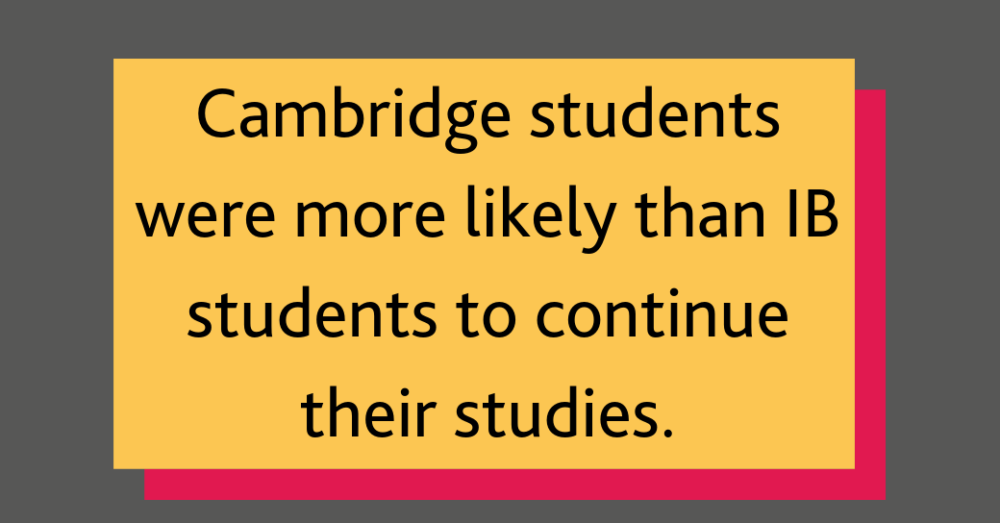
A further phase of our research with Florida State University explored the relationship between accelerated learning programmes and enrolling in Directed Individual Studies (research carried out under guidance) or the university honours programme (a collection of courses that allow students to explore their discipline in greater depth).
We discovered that the likelihood of students undertaking Directed Individual Studies and enrolling on honours programmes goes up with the number of credit hours earned through the Cambridge, IB and AP programmes. In other words, the more pre-college studies a student takes, the more likely they are to be highly engaged in their university studies.
Graduating on time
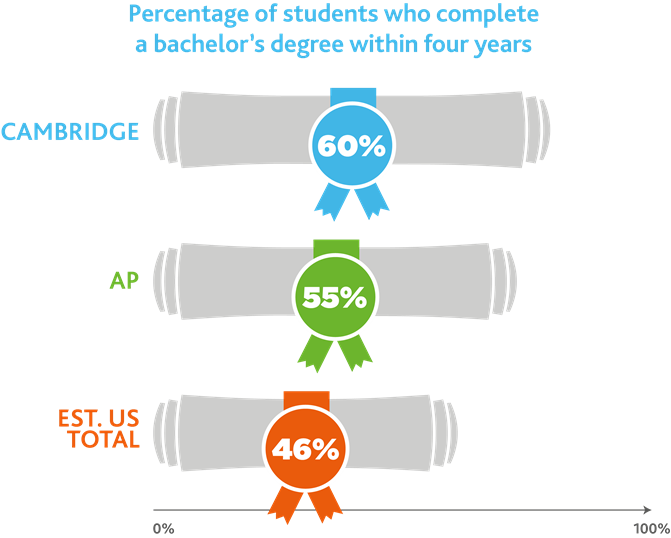
The much larger dataset from the National Student Clearinghouse confirms that students with Cambridge qualifications are more likely to graduate than students with other qualifications. But there’s more: Cambridge students are also more likely to finish their degrees on time. Sixty percent of Cambridge students graduate within four years, compared to 55% of AP students and 46% of US students.
Cambridge gets students ‘college-ready’
We conducted interviews with teachers and students at five high schools in Florida State and Virginia State as well as Florida State University and the University of Minnesota, and were told that the Cambridge courses encourage good study habits, motivate and satisfy students, and prepare them for post-secondary programmes of study, particularly at college. In short, Cambridge gets students ‘college-ready’.
Cambridge qualifications go beyond teaching skills like note-taking, essay-writing and public speaking to strategies for coping with heavier workloads and independent research.
Though some students struggled, they felt Cambridge helped them to push themselves: to ‘do the best I can’. This often meant that they found early college coursework relatively easy.
Cambridge students also valued the critical thinking skills the programme helped them develop, and the ability to work independently. Crucially, they got a taste of time management, and learned how to handle stress better. As one student put it, ‘Cambridge is a mini-version of college’.
Next steps
As our qualifications grow in popularity in the US, we will continue to monitor how Cambridge students perform at college, to ensure we are providing them with the best possible education to prepare them for university, and the world beyond.
[i] Accelerated programmes such as AICE have been growing in popularity in the US in recent years. They can range from subject courses added to a student’s regular programme of study, or more comprehensive programmes aimed at developing higher order thinking skills and deep subject knowledge.
Further reading
Shaw, S. D. & Bailey, C. (2011). Success in the US: are Cambridge International Assessments good preparation for university study? Journal of College Admission, No.213, pp.6-16, (Fall 2011)
Shaw, S. D. (2011). Investigating the impact of Cambridge International Assessments on US stakeholders: student and teacher perceptions. College and University: Educating the Modern Higher Education Administration Professional, Vol.87, No.2, pp.12-23, (Fall 2011)
Shaw, S. D. & Bailey, C. (2011). An American university case study approach to predictive validity: Exploring the issues. Research Matters, Issue 12, pp. 18-26, (June 2011)
Shaw, S. D., Warren, J. & Gill, T. (2014). Assessing the impact of the Cambridge international acceleration program on US university determinants of success: a multi-level modelling approach. College and University Educating the Modern Higher Education Administration Professional. Vol. 89, No.4, (Summer 2014)
Shaw, S. D. & Werno, A. W. (2016). Preparing for college success: exploring the impact of the high school Cambridge acceleration program on US university students. College and University: Educating the Modern Higher Education Administration Professional, Vol.91, No.4
Vidal Rodeiro, C., Crawford, C. & Shaw, S. D. (2017). From ‘AICE’-ing the test to earning the degree: enrollment and graduation patterns among students with the Cambridge Advanced International Certificate of Education (AICE) Diploma. College and University: Educating the Modern Higher Education Administration Professional, Vol.92, No.4, pp. 12-23, (Fall 2017)
Shaw, S. D. & Vidal Rodeiro, C. (2019). The value of predictive validity studies and the need for ‘fit-for-purpose’ data to inform postsecondary admissions policies and decision-making in the United States. Strategic Enrollment Management Quarterly: Advancing research in enrollment and student success. AACRAO. Volume 6, No. 4, pp.23-39, (Fall 2018)



